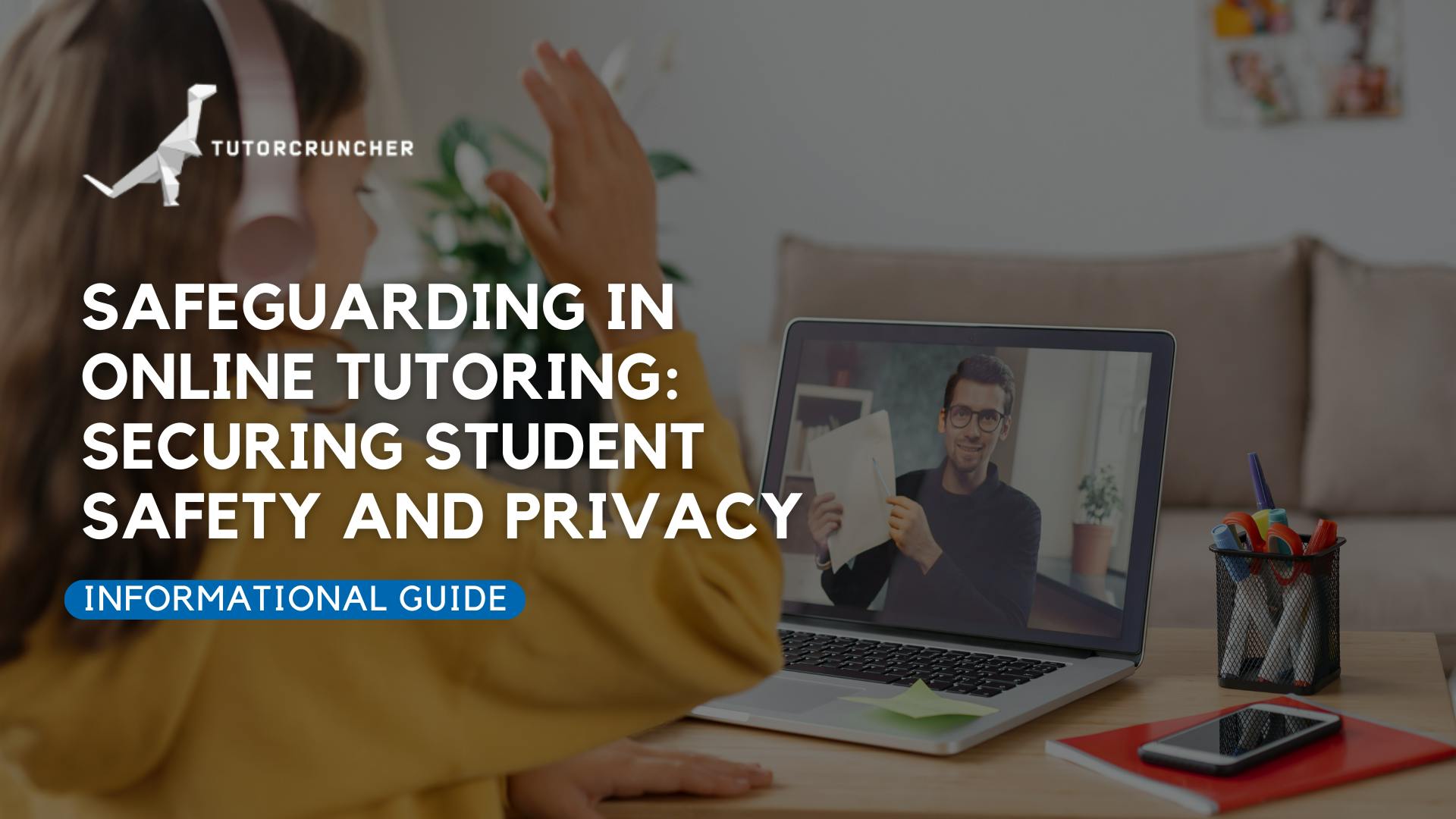The rise of online tutoring presents new challenges in ensuring the safeguarding of children and young people. As a parent or carer, you want your child to benefit from extra educational support without compromising their safety. With online sessions increasingly replacing face-to-face interactions, it's crucial to be aware of safeguarding and child protection measures.
Safeguarding in online tutoring involves regular DBS checks, effective safeguarding training for tutors and adherence to a robust child protection policy. Tutors must report concerns and exercise appropriate behaviour during online sessions to maintain a safe learning environment. These practices prevent risks and protect children from harm, guaranteeing their welfare is a priority.
By understanding your responsibilities and choosing carefully vetted tutors or services, you can help keep children safe in online education. At TutorCruncher, our tutor management software is built with various tools to make sure it is safe for your clients. Keep reading to find some practical tips about safeguarding!
Why Safeguarding Matters in Online Tutoring

Safeguarding in online tutoring is essential to protect both tutors and students. The key aspects include legal requirements, the responsibility of tutors to maintain safety and awareness of risks in digital learning environments.
Legal and Ethical Obligations
Tutors working with children are legally required to complete background checks, such as the Disclosure and Barring Service (DBS) check. DBS checks ensure communication with minors is safe online or face-to-face. Such checks are vital as they verify that tutors are fit to work with young people, guarding against possible abuse.
Ethically, tutors must adhere to safeguarding policies that protect children. Educational bodies provide guidance on maintaining a safe learning space, which includes understanding obligations, reporting concerns, and acting diligently in all tutoring sessions. Clear conduct and adherence to policy help prevent harm and assure carers and parents of their child’s safety.
Responsibility of Tutors to Protect Children
Tutors have a profound duty to safeguard young people from potential risks. Child protection involves being vigilant about any suspicious behaviour during sessions and reporting it to the appropriate authorities immediately. This vigilance helps maintain trust and security in the tutor-student relationship, creating a productive learning environment.
Providing safeguarding training ensures tutors understand their role in protecting students. Training courses cover vital topics, including recognising signs of abuse and reporting procedures, making certain tutors can manage allegations effectively.
Risks Associated with Online Learning Environments
Online learning platforms can expose students to risks such as inappropriate content, cyberbullying and unauthorised contact. Online safety is paramount for tutors, who must maintain protocols to protect students during digital interactions. This involves certifying tight security settings and monitoring communication without infringing on student privacy.
Tutors need to be aware of technology's potential risks and implement measures to protect pupils' welfare. A consistent approach to managing risks helps maintain a safe digital learning environment.
5 Best Practices for Safeguarding in Online Tutoring
When conducting online tutoring sessions, maintaining a safe environment for learners is crucial. Various steps can be taken to ensure the safeguarding of children and young people, including conducting thorough checks, establishing clear conduct guidelines, using secure platforms, addressing concerns sensitively and keeping parents involved.
1. Conducting Enhanced DBS Checks

Enhanced DBS checks are vital in assessing the suitability of tutors for working with children. These checks help identify any past criminal records or warnings that may pose risks to young people. Confirm that all tutors have a valid DBS certificate before beginning their roles.
This process includes verifying prior educational and work experience with past employers. For self-employed and independent tutors not linked to agencies, it’s their responsibility to ensure checks are up to date. Regular updates and monitoring should be conducted to maintain a safe learning environment, reassuring parents and carers about their child’s welfare.
2. Setting Up Clear Codes of Conduct

Establishing a code of conduct for online sessions helps define appropriate behaviour. This includes setting expectations for communication, dress code and acceptable online actions.
Codes of conduct should clearly reflect professional standards, outline the procedure for handling safeguarding concerns and guide managing safeguarding allegations. Inform students and parents of these standards to foster understanding and manage behaviour effectively during sessions.
3. Using Secure, Monitored Platforms for Online Sessions

Choose secure, monitored platforms for conducting online tutoring sessions to protect students from online abuse. Platforms should have robust privacy settings, including protected IDs and secure access links. Tutors must use video conferencing tools that allow for recording sessions, providing a record for review should concerns arise.
Ensure all personal data and recordings are stored securely, following data protection regulations. This helps keep children safe from potential online threats.
4. Addressing Concerns

A straightforward reporting system for addressing safeguarding concerns is essential. Encourage tutors, parents and students to report suspicions of inappropriate behaviour or abuse promptly. Clearly define steps in your safeguarding and child protection policy for handling these situations.
Provide access to support resources, such as local safeguarding agencies or digital safety helplines. Maintaining open channels verifies concerns are managed effectively, with appropriate action taken swiftly to safeguard children’s welfare.
5. Keeping Parents Informed and Involved

To protect children effectively, it's important to keep parents and carers involved. Regularly update them about tutoring content, platforms used and any changes in procedure. Encourage ongoing dialogue where parents can voice concerns or ask questions.
Transparent communication helps build trust, ensuring that parents feel comfortable and informed about their child’s online safety. It also reinforces the collaborative effort needed between tutors, parents and schools in safeguarding children during online education.
3 Common Challenges in Safeguarding Compliance

Establishing effective safeguarding in online tutoring involves overcoming numerous challenges. Self-employed tutors face unique hurdles, professional boundaries must be carefully managed and student data protection is crucial.
1. The Safeguarding Loophole for Self-Employed Tutors
Self-employed tutors may find themselves navigating a less regulated environment, which presents a significant safeguarding challenge. Unlike tutors in schools or regulated organisations, these independent tutors often have more freedom, making consistent oversight difficult.
Ensuring they meet safeguarding standards is crucial. Conducting thorough background checks, such as DBS checks, becomes essential to verify suitability. Parents and carers should be aware of these challenges and request proof of compliance, including training and certification, to assure their child’s tutor is adequately prepared.
2. Maintaining Professional Boundaries Online
In an online setting, maintaining professional boundaries can be particularly challenging. Virtual environments may blur lines that are clearer in face-to-face interactions, increasing risks of inappropriate behaviour. Tutors should establish clear guidelines for online sessions.
Tutors should conduct sessions in a professional manner, reflecting appropriate conduct. All communication should be restricted to educational content, with any personal interactions clearly outlined in initial agreements.
3. Protecting Student Data and Privacy
Protecting the privacy of students in an online learning environment is crucial. Using secure platforms and encrypted communication tools helps in maintaining confidentiality. Tutors must manage and store personal information responsibly, following local data protection laws.
To ensure compliance, tutors should limit the collection of personal data to what is necessary for educational purposes. For instance, sharing contact details should only occur through secure channels with parental approval. Providing families with guidance on safe online practices helps strengthen overall data protection efforts.
How TutorCruncher Simplifies Safeguarding
TutorCruncher enhances safeguarding in online tutoring by ensuring GDPR compliance, facilitating secure communications, automating safeguarding requirement tracking and using analytics to identify potential concerns. These systems contribute to a safer environment for children and young people engaged in tutoring sessions.
GDPR Compliance for Data Protection
TutorCruncher is fully compliant with GDPR, ensuring the personal data of both students and tutors is safe. This protects the privacy of children, young people and their families and fosters trust in the tutoring process.
Our data management policies prevent unauthorised access to any personal items or sensitive information, maintaining a high standard of confidentiality.
Secure Communication and Session Monitoring Tools
TutorCruncher includes tools that support secure communication, critical for safeguarding and child protection during online sessions. For example, we use MultiFactor Authentication to keep you and your data safe.
Monitoring capabilities allow session reviewing to help maintain children and young people’s safety during tutoring. The ability to trace communications back if concerns arise benefits both tutors and families by creating a transparent and secure environment.
Automating Tracking of Safeguarding Requirements
The automation of safeguarding requirements, such as DBS checks, is a central feature of TutorCruncher. This automation ensures that only qualified tutors with the necessary background checks can conduct sessions, protecting you from potential safeguarding and child protection issues.
Analytics to Identify Potential Safeguarding Concerns
Analytics tools within TutorCruncher are designed to identify potential safeguarding concerns proactively. By analysing patterns and behaviours during sessions, you can pinpoint unusual activities and raise them for further investigation, protecting children from possible risks.
This capability allows tutors and safeguarding officers to respond swiftly, ensuring any safeguarding issues are addressed promptly. Such analytical tools are invaluable in protecting the welfare of students by providing a systematic approach to managing and mitigating potential risks during tutoring sessions.
Frequently Asked Questions

How can parents ensure their child’s tutor is compliant with safeguarding?
Parents should confirm that their child's tutor has undergone necessary background checks, such as a DBS check, which is vital for safeguarding students. Checking if the tutor has safeguarding training can also provide reassurance.
Additionally, parents can ask the tutoring service for their safeguarding policy to understand their procedures in reporting concerns.
What safeguarding features does TutorCruncher offer?
TutorCruncher offers several features designed to maintain a secure online environment. These can include secure communication tools and detailed session records to aid in managing potential risks.
We also offer lesson recording that can be put on default, ensuring that tutors adhere to best practices in child protection.
Can TutorCruncher help with data protection and GDPR?
Yes, TutorCruncher can help with data protection and GDPR. It provides secure data storage and management solutions that align with GDPR requirements.
Summary

When engaging in online tutoring, it's crucial to focus on safeguarding children and young people. As a tutor, you must ensure the welfare of your students by understanding your responsibilities in protecting them from harm. Always prioritise the child's welfare by managing allegations promptly and maintaining appropriate behaviour.
In general, it’s important to know when to report concerns to the relevant local authority or designated safeguarding lead. As a tutoring software company, we at TutorCruncher understand the importance of online safety.
This is why we offer a 14-day free trial to let you experience our fully GDPR-compliant software to see if you’re satisfied. If you have any more queries, contact us at info@tutorcruncher.com or 020 3966 1863.




